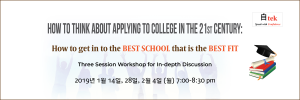College Admission Workshop

- This event has passed.
College Admission Workshop
April 16, 2020 @ 6:30 pm - 8:00 pm

4월개강 예정 6:30 – 8:00 PM
부모와 자녀가 함께 배우는 차별화된 대학 진학 전략
College Admissions Workshop for 7th – 12th grade students & parents with Sophisticated Strategies You NEED to SUCCEED
자녀에게 맞는 대학을 선택하도록 돕고 싶은데 미국 교육 시스템에 대해 잘 모르신다면, 남들을 따라가는 것이 아닌, 내 자녀에게 맞는 전공과 대학을 선택할 수 있도록 준비하고 싶으시다면, 하버드 대학교 입학 면접관인 Ja-Tek 멘토들과 함께 대학 입학 프로세스와 진학 전략에 대해 배워보세요.
1. 독특한 미국 대학 시스템 해부- 나에게 맞는 대학 선택하기
The American college system is unique. How do you decide which to apply to?
2. 입학 면접관의 눈으로 본 합격 결정에 영향을 미치는 요인들을 이해하고 나에게 적용하기
The spectrum of variables for the admission process and how to take advantage of it. What is the impact of Legacy, Athletics, and Musical Talents, etc.?
3. 차별화 된 ‘나만의 스토리’가 답이다. ‘나만의 스토리’를 만드는 핵심 전략
The personality profile or story is a key. How to create it?
4. 개인 코칭 Individualized Coaching (Optional Session) 에세이 쓰기, 인터뷰 준비, 목표 대학 리스트 만들기
How to do an outstanding essay writing, an admissions interview, and listing up your own best target schools!
수강료: $100(Member) / $150(Non-member)
문 의: 201-541-1200 ext.111
自tek College Prep: Sophisticated Strategies (additional discussion)
We understand that when a student applies to college, every decision affects the whole family. That’s why we encourage parents and students to attend our workshops together. Families need a solid foundation of shared information to build a smart strategy for a successful result.
The stakes are high. Tuition is expensive. Competition is fierce: Harvard, MIT, and Princeton admit around 5% from tens of thousands of applicants. The stress on kids and the entire family can be brutal. The process itself is complicated. For example, do you know the difference between Early Action (EA), Early Decision (ED) and Regular Action (RA)? You should, because admissions rates are up to three times higher in ED versus RA.
Meanwhile, some families pay thousands for private admissions “consultants.” Private high schools have an entire staff dedicated to guiding their students, one-by-one, into the most elite colleges. And it’s frustrating that some families know the secrets of the process, having “played the game” for generations. It seems unfair – because it is.
But there is a way to level the playing field: Good Information. The most sophisticated strategies for applying to elite colleges should not be secret. This workshop teaches your family many of the same proven strategies, detailed information, and successful techniques that an expensive “consultant” would – across the whole, complicated spectrum of issues that determine admissions success – including these:
• The US system is unique. In most countries, admissions are decided by an objective exam. The American system is highly “subjective.” Therefore, the subjective half of the application, beyond SAT scores and GPA, is just as important, including depth of Extracurriculars, Essays, Interviews, “intellectual curiosity,” “personality” and “character.” It is therefore crucial for each applicant to create a coherent personal “profile” or “story” that makes sense across the full application. This process of self-awareness should start as early as middle school (it will help for everything else in life too!). It requires hard work, thought, and planning. But if you ignore it, or wait until senior year, you are at a big disadvantage.
• In most countries, only a few government-sanctioned Universities are truly “elite.” In the US, there are 25 elite colleges, and each is looking for a slightly different kind of applicant. Therefore a sophisticated understanding of the differences between schools is essential to a successful application strategy. Many families spend an enormous amount of time (and money) preparing for the SAT/ACT and achieving a high GPA, but relatively little working on a strategy to customized their “list” of schools to apply to, and why. This is a big mistake. This process often referred to as “finding the right fit,” requires research, hard work – and more even self-awareness.
• It’s important to understand the details of the application process, for example: should you apply Early Decision or Early Action? How many schools should you apply to? Should you interview? Visit campus? How do the decisions actually get made? Basic facts are important: what is the role of “legacy”? “diversity”? Athletics? What is the Ivy League, exactly? (Answer: it’s an athletic league). What is the difference between a college and university? What’s the advantage of “liberal arts” education vs “pre-professional”?
JOIN US IN A UNIQUE, PERSONALIZED WORKSHOP AT THE KCC!
2기 수료자: 4/15/2019
Louise Kim, Bryce Kim, Sarah Park, Nicholas Pyun
1기 수료자: 2/4/2019
Yunkyeong Jeong, Emily Gil, John Kim, Emily Kwen, Michael Peak
이전 워크샵 보러가기


